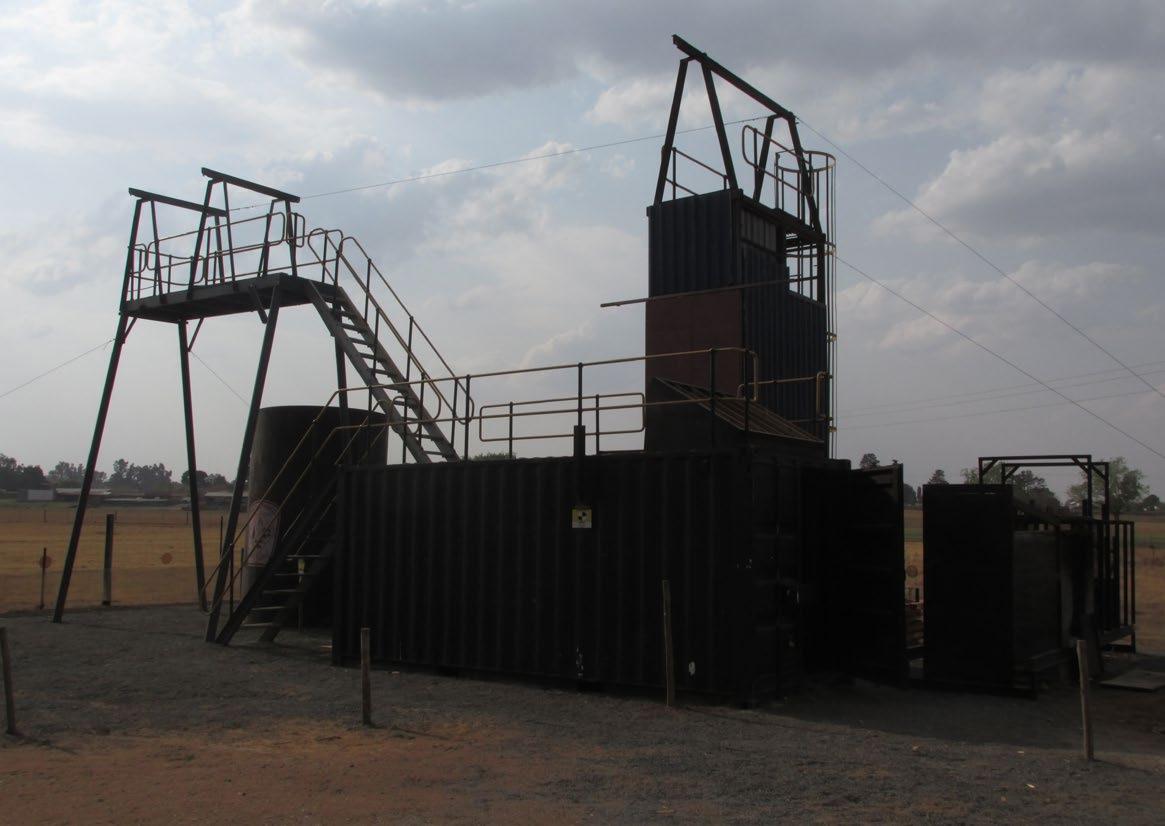
4 minute read
Pro Ethnos Fire and Rescue Training Centre provides practical and online training
The Pro Ethnos Fire and Rescue Training Centre is situated in Sundra, Mpumalanga and provides emergency fire and rescue services as well as training. Pro Ethnos Fire and Rescue was first established in Utrecht KwaZulu-Natal in 2012 but relocated its campus to Rietkol, Sundra in Mpumalanga, on the Gauteng border, in 2019. Pro Ethnos Fire and Rescue Training was registered in 2015 as a Pty Ltd; the company was previously known as Pro Ethnos Services that was registered in 2012.
The training centre is co-owned and managed by Jurie van Staden, whose employment history includes multiple private medical and fire services as well as hazardous material services.
Advertisement
Pro Ethnos has six part time instructors and, between them, have over 80 years’ experience ranging from a wide array of services in South Africa including municipal, Government, aviation and industrial fire departments.

Pro Ethos Fire and Rescue Training was created to provide cost effective, high-quality training to individuals involved in volunteer organisations. The core focus is to provide a place for individuals to obtain training previously only possible at higher cost and selective institutions. Fire and Rescue International spoke to Jurie van Staden, director of operations at Pro Ethnos Fire and Rescue to find out more about their offering.
Accreditation
The training programme is aligned to meet the SAQA requirements, while also maintaining a skill level equal to the NFPA programmes. The programmes are re-assessed annually or when new techniques are tested and on recommendations of a number of USA focus groups.
Pro Ethnos Fire and Rescue holds accreditation with Local


Government SETA for the full Further Education Training Certificate (FETC) and Rescue and the National Certificate Supervision; Fire and Rescue Operations, with their main accreditation with Transport Education Training Association (TETA).
Training facilities
Pro Ethnos has one lecture room able to seat 12 to 14 students and five store rooms. They also have personal protective equipment (PPE), hardware such as positive pressure ventilation (PPV), chainsaws and hoses, a selfcontained breathing apparatus (SCBA) service and refill, a fire extinguisher service and refill and a workshop. “Our hydrant system includes operational deluge sprinkler system, hose reel, Storch coupling hydrant, standpipe head hydrant as well as two normal hydrants”, said van Staden. The training centre has a drill platform for students to attend parades and there are also two dummy hydrants for hose drills. The training centre’s platform is also used for fitness evaluations. Other structures include a basement fire simulator attached to the structural fire simulator, the liquefied petroleum gas (LPG) and transformers simulator, vehicle fire simulator, smoke room, petrochemical fire simulator, second storey bail out window, Denver and Pittsburgh drill simulator, vertical tank for vessel entry and rescue, Hazardous material simulator including pipe rack, plug and patch drum and a fuel pump leak simulator.
Pro Ethnos Fire and Rescue has trained over 500 students since 2015. “We limit our class ratio to five to eight students to one instructor. Our curriculum includes fire and rescue subjects, including the full Further Education Training Certificate (FETC), Firefighter 1 and 2 and the National Certificate Supervision. Subject includes 14 rescue modules ie rope rescue, light and heavy motor vehicle rescue, confined space and trench rescue, marine and swift water rescue, aviation fire and rescue, collapse, trench and wilderness search and rescue”, said Van Staden.
Fire subjects include the full Fire Fighter 1 and 2 programme and they also provide Fire Safety Inspector, Fire and Rescue Supervisor (Fire Officer 1), Foam Operations and Ventilation Training.




Training also includes the Hazardous Material Awareness Level, Hazardous Material Operation Level and Hazardous Material Supervisor (Technician Level).
Pro Ethnos Fire and Rescue also offer workshops in forcible entry techniques, rapid intervention training, thermal imaging, hazardous material rescue and rapid intervention team training (RITT).
“Our training methodology is based on theoretical class work and assignments, practical training and road practical experience for our long term students as part of our volunteer programme, Pro Ethnos Volunteer Rescue Squad Co. Our belief is that the class room provides a base for what should be taught in the practical and that true training can only be achieved through live fire training and practical hands on experience”, said Van Staden.
Pro Ethnos also offers international online fire training through a registered partner in Texas in the USA.
Pro Ethnos has a pass rate of between 60 to 80 percent per class with a required pass mark for final written assessment of 75 percent.
Van Staden added, “Our trainees’ ages range from 18 to 48 with the greater number of students being between the ages of 25 to 38.”
“We assist students to obtain employment through recommending students who has achieved the required outcomes to a wide range of our clients that has private services. On average, we are able to assist between 60 to 80 percent of our unemployed students to obtain employment.”
Pro Ethnos offer students the opportunity to obtain skills in real life training environments, although a high quality theory is trained students are equipped and trained through hands on training in the situations that they may encounter, Pro Ethnos Offer the type of training that will push a student to realise their potential.










